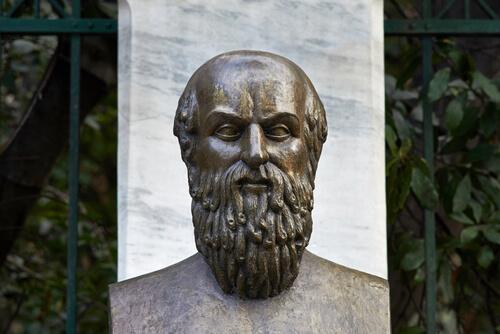Esquilo’s great phrases take us into a tragic world in which fate imprisons us without the possibility of fleeing. Recognized as one of the great Greek tragic ones, along with Sophocles and Euripides, his conception of fictional life is marked by moira and hybrid.
Remember that moira is an eternal fatality. This inevitability will always reach us, for it completely governs nature, even above the power of the gods. That said, for the greatest pride or qualities we can have, that is, hybris, nothing can be done to escape fate, because a single hour of punishment reaches everyone.
- That said.
- We can focus on a series of Eskimo phrases that show us a way to see the world that.
- One way or another.
- Even today.
- 2500 years after his death.
- We can consider current.
It should be remembered that Esquilo lived between 525 BC. and 456 BC, amid Greek splendor. A burst full of knowledge, but also success on the battlefields, such as those that took place in Salamina or Marathon against the Persians.
Among his most striking works are the Orestaada trilogy, Prometheus Chained and Sete Contra Thebes, highlighting the tension between classical belief and the new Greek movements, more rationalistic and democratic.
Here’s a selection of the best Eskimo phrases
“Truth is the first victim of war. “
For Esquilo, the truth always loses during wars. What comes first are interests, which allow you to lie and manipulate for a specific purpose, the final victory?To achieve this, however, thousands of human lives must perish.
“The relationship forces. “
So simple it can even scare you. Equilo shows the importance of family relationships and how these bonds always translate into commitments. In ancient Greece, it was not strange that a father, for example, had children outside of marriage who appeared as heirs. .
It is true that this way of thinking was quite advanced for the time, because family members did not always fulfill the commitments socially associated with this type of connection.
“It is a great pleasure to see our children around us, but from this good fortune is born the greatest bitterness of man. “
To be sure, studying family relations in ancient Greece would merit further research, yet this phrase has a lot of meaning both yesterday and today.
In most cases, the birth of a child is accompanied by immense joy, although sometimes bitterness can also be associated with them. Can they get sick, argue, have problems? Decidedly, they can end up being a constant cause for concern, because anything that happens to them can become a great source of suffering for parents.
“Listen to only most people and you’ll only hear one part. “
It is a wonderful and perfect phrase for the time in which we live, in front of a judge you can still hear both sides. In politics, we have to understand different points of view in the same way, it actually works for all facets of life.
Interestingly, we are the ones who often want to see or hear only part of it. We read the diary with which we identify and that says what we want to listen to, we listen to the radio that interests us and we see the television channels that are closest to our way of thinking. We also refer only to people or ideologies similar to our own.
Unfortunately, this phrase teaches us a lot today. If we only have a part of something left, we’re still missing an overview.
“The power of need is irresistible. “
Few authors, like Esquilo, claim that a person motivated by necessity has no limits, it is a natural thing, because when we are hungry we need to eat, as well as when we are thirsty, the water becomes much more refreshing.
Nothing can stop our need. That’s why people who need something and are looking for it not to find it, because for them it’s fundamental, it’s the first need, no matter what the ideology or philosophy is, for example, if you have nothing to eat.
That’s why smaller needs are left out and become of little importance when we have other unmet basic needs.
“What it will be. “
There are many Esquilo phrases that deserve to be here, but we don’t have much room left, so we’d like to say goodbye with a phrase we still use many times today.
Esquilo, like so many Greeks, was fully convinced of the inviolability of certain elements of our future. You can do anything, whatever happens, it will happen, because nothing escapes what is written in destiny: first birth and then death.

